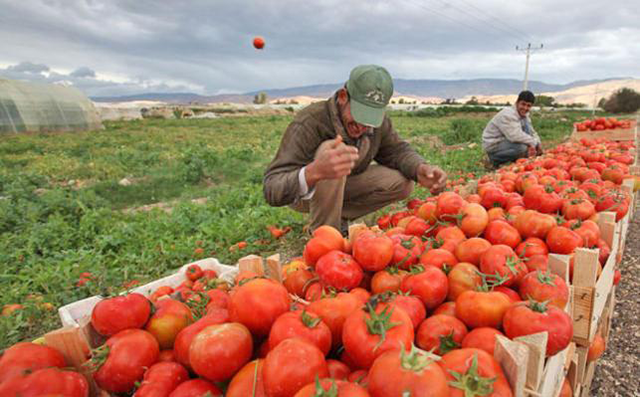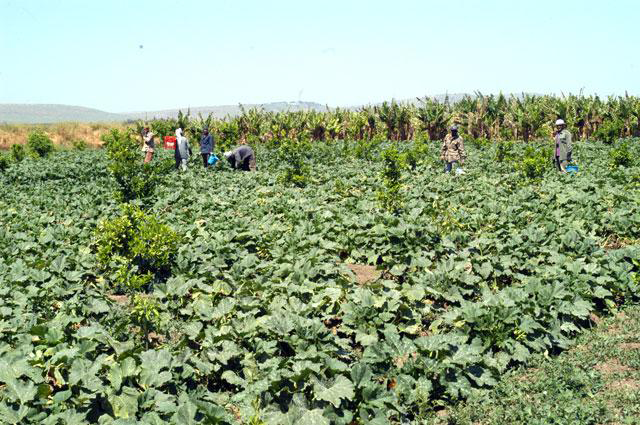You are here
KHF advocates for stronger rights for agricultural workers in Jordan
By Maria Weldali - Nov 14,2024 - Last updated at Nov 14,2024

The Information and Research Centre – King Hussein Foundation (IRC-KHF) releases in a position paper titled “Towards Strengthening the Rights of Workers in the Agricultural Sector under the Agricultural Workers’ Regulation No. 19 of 2021 (JT file)
AMMAN — Despite the significance of the Agricultural Workers’ Regulation No.19 of 2021 and the proposed amendments and their intended goals, the current regulation, along with the suggested changes, does not address the core challenges within the agricultural sector.
The regulation "fails" to reflect the actual conditions faced by workers, the Information and Research Centre – King Hussein Foundation (IRC-KHF) revealed in a new position paper.
The centre, in partnership with the Arab Network for Civic Education (ANHRE), released on Wednesday a position paper titled “Towards Strengthening the Rights of Workers in the Agricultural Sector under the Agricultural Workers’ Regulation No. 19 of 2021,” underscoring the importance of promoting fair labour practices in the country’s agricultural sector.
“This paper reflects an ongoing commitment to supporting government efforts to amend the aforementioned Agricultural Workers’ Regulation, with the aim of expanding social security coverage for agricultural workers,” according to the KHF.
The KHF proposal focuses on repealing Article 15 of the regulation, which currently exempts agricultural employers with three or fewer workers from certain obligations. These include setting daily work hours, providing rest periods, offering weekly holidays, and enrolling workers in social insurance as mandated by the Social Security Law.
The paper also highlights the critical need for regulatory reforms to advance fair labour practices and safeguard the rights of agricultural workers, who play an essential role in Jordan’s economy.
By pushing for these changes, the centre and ANHRE aim to build a more inclusive and equitable framework that broadens social protection and enhances working conditions for a greater segment of the agricultural workforce.
KHF Director Ayman Halaseh said: “It is essential not to remain fixed on existing frameworks; instead, we must consider a new model that takes into account all categories of farmers.”
He added that the very nature of agricultural work practices often leads to irregular relationships between workers and farm owners.
Head of the Workers' House and legal affairs expert Hamada Abu Nijmeh said, "While the regulation’s exclusion of employers with three or fewer workers presents a challenge, even if these employers were included, a significant barrier remains.
Farmers often work across multiple farms, which means they don’t have a single employer. This makes it difficult for them to access basic benefits," he added.
To improve social security coverage for workers in the sector and to ensure their access to their fundamental rights, it is crucial to implement practical, administrative, and legislative measures that account for the seasonal and inconsistent nature of agricultural employment, Halaseh added.
These measures include recognising the relationship between workers and farmers through digital platforms or other appropriate means, and adjusting labour systems to align with actual practices on the ground, in addition to other practical and adequate measures.
President of the General Union of Workers in Water, Agriculture, and Food Industries Bushra Salman said, "The agricultural sector suffers from the lack of a clear and comprehensive database, which impedes effective planning, decision-making, and resource allocation.
The data gap limits the sector's ability to assess its current situation, track growth, monitor challenges, and make informed policy or business decisions," Salman added.
The KHF in its paper noted that most agricultural workers operate under a daily wage system, hired through intermediaries to work on different farms during specific seasons.
This arrangement leaves workers without a permanent employer to whom they can turn for labour rights, such as annual, sick, or maternity leave. “The contractual relationship between the worker and the farm owner ends with the completion of the workday and the receipt of the agreed wage,” the foundation said.
Related Articles
AMMAN — The Information and Research Centre - King Hussein Foundation (IRC-KHF), on Wednesday delivered a training session to journalists on
AMMAN — The Ministry of Agriculture on Monday formed a committee to reconsider a recent decision to reduce the number of non-Jordanian farm
AMMAN — Tamkeen has recently launched a coalition to advocate for enhanced rights for agricultural workers, with a primary goal of increasin


















